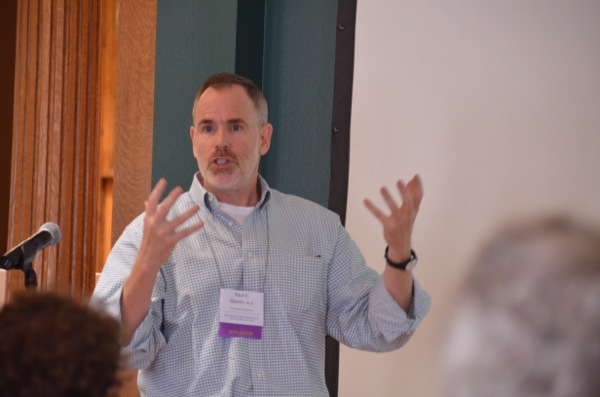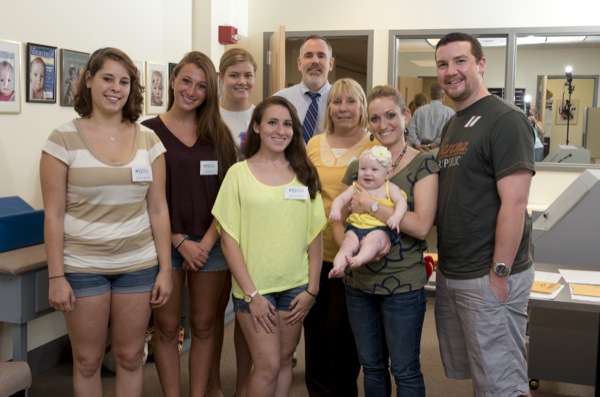


Francis Alison Award
Quinn selected for UD's highest faculty honor
3:02 p.m., May 8, 2013--Paul Quinn, professor of psychology at the University of Delaware and an internationally known scholar in the field of perceptual and cognitive development of infants, has received the 2013 Francis Alison Faculty Award.
The award, the University's highest competitive faculty honor, was established by the Board of Trustees in 1978 to recognize the faculty members who best demonstrate the combination of scholarship and teaching exemplified by the Rev. Francis Alison, founder of the institution that is now UD. The annual award also confers membership in the Francis Alison Society.
Honors Stories
National Medal of Science
Warren Award
"Paul Quinn has had a highly productive and influential research career that has fundamentally altered our understanding of infant perception and cognitive development," said Nancy Brickhouse, interim provost. "He truly exemplifies the 'scholar-schoolmaster' ideal and is a most worthy addition to the eminent pool of scholars."
Quinn is widely regarded for his research on how infants perceive the world and appear to classify objects and even faces into categories long before they are able to speak. He has been equally praised for his successful teaching in both introductory and advanced psychology courses and for the research opportunities and mentoring he provides in his lab to undergraduates as well as graduate students.
"We are fortunate to have Paul Quinn as a member of our faculty," said George Watson, dean of the College of Arts and Sciences. "He is one of our most influential researchers, opening important frontiers in cognitive psychology. His work and reputation have brought attention and recognition to the University of Delaware."
Quinn, who joined UD after previous faculty positions at Washington and Jefferson College and the University of Iowa, identified the "big question" in his field of research as how a baby develops into an intelligent adult. His research, in which he studies the length of time infants spend looking at objects to seek to determine how they are perceiving their environment, contrasts with the traditional view that the concepts humans use to think about the world are products of language and instruction.
"I think our work has shown that at least the initial beginnings of our ability to parse the world into meaningful groupings begins in pre-verbal infants," Quinn said. "Young infants do not experience the world as an undifferentiated bunch of grapes. They have the ability to sort, for example, the cats from the dogs just based on appearance information."
That work has gained wide professional recognition. In a letter supporting Quinn's nomination for the Alison Award, an outside researcher wrote that he is “easily recognized as one of the strongest and world-renowned leaders in the field of developmental human cognition, with seminal contributions to the science of how young infants represent information about people, places and things.”
Other letters of support came from former UD students, many of them now doctoral students or faculty members in various academic departments of psychology. "Dr. Quinn’s innovative teaching methods that incorporate real-world applications to material learned in the classroom, and his dedication to mentoring students, should be an example for all those involved in academia,” wrote one former student, who also noted that Quinn always "treated his students more like colleagues."
Doug Doren, senior associate dean in the College of Arts and Sciences, said that Quinn's "influence extends far beyond that of his own work [because of his efforts in] engaging young psychologists in research and teaching them to succeed in their careers."
To Quinn, teaching students at all levels and mentoring them in his lab are highly enjoyable aspects of his work. One of the highlights of teaching comes when he can help a student transform his or her thinking and realize: "I can do this. I can do science. I can make a contribution," he said.
Receiving the Alison Award, Quinn said, left him "surprised, flattered and honored to be joining such a distinguished group of scholars." He thanked all the support his nomination received, including the "strong advocacy" of Gregory Miller, professor and chairperson of the psychology department.
“Paul is an outstanding faculty member on every criterion," Miller said in summarizing Quinn's qualifications. "His research has changed the field of child development; his classroom teaching is superb; his in-lab teaching and mentoring have inspired numerous undergraduate and graduate students; his scholarship has been continuously funded for over 20 years; and his service to UD and the scholarly community are exceptional.”
A list of previous recipients of the Francis Alison Award is available on this website.
Article by Ann Manser
Photos by Kathy F. Atkinson










